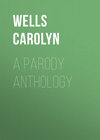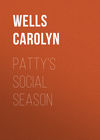Читать книгу: «A Parody Anthology», страница 14
THE ELDERLY GENTLEMAN
BY the side of a murmuring stream, an elderly gentleman sat,
On the top of his head was his wig, and a-top of his wig was his hat.
The wind it blew high and blew strong, as the elderly gentleman sat;
And bore from his head in a trice, and plunged in the river his hat.
The gentleman then took his cane, which lay by his side as he sat;
And he dropped in the river his wig, in attempting to get out his hat.
His breast it grew cold with despair, and full in his eye madness sat;
So he flung in the river his cane to swim with his wig and his hat.
Cool reflection at last came across, while this elderly gentleman sat;
So he thought he would follow the stream, and look for his cane, wig, and hat.
His head, being thicker than common, o'erbalanced the rest of his fat,
And in plumpt this son of a woman, to follow his wig, cane, and hat.
George Canning.
TURTLE SOUP
BEAUTIFUL soup, so rich and green,
Waiting in a hot tureen!
Who for such dainties would not stoop?
Soup of the evening, beautiful Soup?
Soup of the evening, beautiful Soup?
Beau – ootiful Soo – oop!
Beau – ootiful Soo – oop!
Soo – oop of the e – e – evening,
Beautiful, beautiful Soup!
"Beautiful Soup! Who cares for fish,
Game, or any other dish?
Who would not give all else for two p
Ennyworth only of beautiful Soup?
Pennyworth only of beautiful soup?
Beau – ootiful Soo – oop!
Beau – ootiful Soo – oop!
Soo – oop of the e – e – evening,
Beautiful, beauti – FUL SOUP!"
Lewis Carroll.
SOME DAY
(To an Extortionate Tailor)
I KNOW not when your bill I'll see,
I know not when that bill fell due,
What interest you will charge to me,
Or will you take my I. O. U.?
It may not be till years are passed,
Till chubby children's locks are gray;
The tailor trusts us, but at last
His reckoning we must meet some day.
Some day – some day – some day I must meet it,
Snip, I know not when or how,
Snip, I know not when or how;
Only this – only this – this that once you did me —
Only this – I'll do you now – I'll do you now now —
I'll do you now!
I know not are you far or near —
Are you at rest, or cutting still?
I know not who is held so dear!
Or who's to pay your "little bill"!
But when it comes, – some day – some day —
These eyes an awful tote may see;
And don't you wish, my tailor gay,
That you may get your £. s. d.?
Some day – some day – some day I must meet it,
Snip, I know not when or how,
Snip, I know not when or how;
Only this – only this – this that once you did me —
Only this – I'll do you now – I'll do you now now —
I'll do you now!
F. P. Doveton.
IF I SHOULD DIE TO-NIGHT
IF I should die to-night
And you should come to my cold corpse and say,
Weeping and heartsick o'er my lifeless clay —
If I should die to-night,
And you should come in deepest grief and woe —
And say: "Here's that ten dollars that I owe,"
I might arise in my large white cravat
And say, "What's that?"
If I should die to-night
And you should come to my cold corpse and kneel,
Clasping my bier to show the grief you feel,
I say, if I should die to-night
And you should come to me, and there and then
Just even hint 'bout paying me that ten,
I might arise the while,
But I'd drop dead again.
Ben King.
A LOVE SONG
(In the modern taste, 1733)
FLUTTERING spread thy purple pinions,
Gentle Cupid, o'er my heart;
I, a slave in thy dominions;
Nature must give way to art.
Mild Arcadians, ever blooming,
Nightly nodding o'er your flocks,
See my weary days consuming
All beneath yon flowery rocks.
Thus the Cyprian goddess weeping
Mourn'd Adonis, darling youth;
Him the boar, in silence creeping,
Gored with unrelenting tooth.
Cynthia, tune harmonious numbers,
Fair Discretion, string the lyre;
Soothe my ever-waking slumbers;
Bright Apollo, lend thy choir.
Gloomy Pluto, king of terrors,
Arm'd in adamantine chains,
Lead me to the crystal mirrors
Watering soft Elysian plains.
Mourning cypress, verdant willow,
Gilding my Aurelia's brows,
Morpheus hovering o'er my pillow,
Hear me pay my dying vows.
Melancholy smooth Meander,
Swiftly purling in a round,
On thy margin lovers wander,
With thy flowery chaplets crowned.
Thus when Philomela drooping
Softly seeks her silent mate,
See the bird of Juno stooping;
Melody resigns to fate.
Dean Swift.
OLD FASHIONED FUN
WHEN that old joke was new,
It was not hard to joke,
And puns we now pooh-pooh,
Great laughter would provoke.
True wit was seldom heard,
And humor shown by few,
When reign'd King George the Third,
And that old joke was new.
It passed indeed for wit,
Did this achievement rare,
When down your friend would sit,
To steal away his chair.
You brought him to the floor,
You bruised him black and blue,
And this would cause a roar,
When your old joke was new.
W. M. Thackeray.
THEMES WITH VARIATIONS
HOME SWEET HOME WITH VARIATIONS
(Being suggestions of the various styles in which an old theme might have been treated by certain metrical composers)
Fantasia
I
The original theme as John Howard Payne wrote it:
MID pleasures and palaces though we may roam,
Be it ever so humble, there's no place like home!
A charm from the skies seems to hallow it there,
Which, seek through the world, is not met with elsewhere.
Home, home! Sweet, Sweet Home!
There's no place like Home!
An exile from home, splendor dazzles in vain!
Oh, give me my lowly thatched cottage again!
The birds singing gaily that came at my call!
Give me them! and the peace of mind, dearer than all.
Home, home! Sweet, Sweet Home!
There's no place like Home!
II
(As Algernon Charles Swinburne might have wrapped it up in variations)
('Mid pleasures and palaces – )
As sea-foam blown of the winds, as blossom of brine that is drifted
Hither and yon on the barren breast of the breeze,
Though we wander on gusts of a god's breath, shaken and shifted,
The salt of us stings and is sore for the sobbing seas.
For home's sake hungry at heart, we sicken in pillared porches
Of bliss made sick for a life that is barren of bliss,
For the place whereon is a light out of heaven that sears not nor scorches,
Nor elsewhere than this.
(An exile from home, splendor dazzles in vain – )
For here we know shall no gold thing glisten,
No bright thing burn, and no sweet thing shine;
Nor love lower never an ear to listen
To words that work in the heart like wine.
What time we are set from our land apart,
For pain of passion and hunger of heart,
Though we walk with exiles fame faints to christen,
Or sing at the Cytherean's shrine.
(Variation: An exile from home – )
Whether with him whose head
Of gods is honored,
With song made splendent in the sight of men —
Whose heart most sweetly stout,
From ravishing France cast out,
Being firstly hers, was hers most wholly then —
Or where on shining seas like wine
The dove's wings draw the drooping Erycine.
(Give me my lowly thatched cottage – )
For Joy finds Love grow bitter,
And spreads his wings to quit her,
At thought of birds that twitter
Beneath the roof-tree's straw —
Of birds that come for calling,
No fear or fright appalling,
When dews of dusk are falling,
Or daylight's draperies draw.
(Give me them, and the peace of mind – )
Give me these things then back, though the giving
Be at cost of earth's garner of gold;
There is no life without these worth living,
No treasure where these are not told.
For the heart give the hope that it knows not,
Give the balm for the burn of the breast —
For the soul and the mind that repose not,
Oh, give us a rest!
III
(As Mr. Francis Bret Harte might have woven it into a touching tale of a western gentleman in a red shirt)
Brown o' San Juan,
Stranger, I'm Brown.
Come up this mornin' from 'Frisco —
Be'n a-saltin' my specie-stacks down.
Be'n a-knockin' around,
Fer a man from San Juan,
Putty consid'able frequent —
Jes' catch onter that streak o' the dawn!
Right thar lies my home —
Right thar in the red —
I could slop over, stranger, in po'try —
Would spread out old Shakspoke cold dead.
Stranger, you freeze to this: there ain't no kinder gin-palace,
Nor no variety-show lays over a man's own rancho.
Maybe it hain't no style, but the Queen in the Tower o' London,
Ain't got naathin' I'd swop for that house over thar on the hill-side.
Thar is my ole gal, 'n' the kids, 'n' the rest o' my live-stock;
Thar my Remington hangs, and thar there's a griddle-cake br'ilin' —
For the two of us, pard – and thar, I allow, the heavens
Smile more friendly-like than on any other locality.
Stranger, nowhere else I don't take no satisfaction.
Gimme my ranch, 'n' them friendly old Shanghai chickens —
I brung the original pair f'm the States in eighteen-'n'-fifty —
Gimme me them and the feelin' of solid domestic comfort.
Yer parding, young man —
But this landscape a kind
Er flickers – I 'low 'twuz the po'try —
I thought that my eyes hed gone blind.
Take that pop from my belt!
Hi, thar! – gimme yer han' —
Or I'll kill myself – Lizzie – she's left me —
Gone off with a purtier man!
Thar, I'll quit – the ole gal
An' the kids – run away!
I be derned! Howsomever, come in, pard —
The griddle-cake's thar, anyway.
IV
(As Austin Dobson might have translated it from Horace, if it had ever occurred to Horace to write it)
RONDEAU
At home alone, O Nomades,
Although Mæcenas' marble frieze
Stand not between you and the sky,
Nor Persian luxury supply
Its rosy surfeit, find ye ease.
Tempt not the far Ægean breeze;
With home-made wine and books that please,
To duns and bores the door deny,
At home, alone.
Strange joys may lure. Your deities
Smile here alone. Oh, give me these:
Low eaves, where birds familiar fly,
And peace of mind, and, fluttering by,
My Lydia's graceful draperies,
At home, alone.
V
(As it might have been constructed in 1744, Oliver Goldsmith, at 19, writing the first stanza, and Alexander Pope, at 52, the second)
Home! at the word, what blissful visions rise,
Lift us from earth, and draw toward the skies;
'Mid mirag'd towers, or meretricious joys,
Although we roam, one thought the mind employs:
Or lowly hut, good friend, or loftiest dome,
Earth knows no spot so holy as our Home.
There, where affection warms the father's breast,
There is the spot of heav'n most surely blest.
Howe'er we search, though wandering with the wind
Through frigid Zembla, or the heats of Ind,
Not elsewhere may we seek, nor elsewhere know,
The light of heaven upon our dark below.
When from our dearest hope and haven reft,
Delight nor dazzles, nor is luxury left,
We long, obedient to our nature's law,
To see again our hovel thatched with straw:
See birds that know our avenaceous store
Stoop to our hand, and thence repleted soar:
But, of all hopes the wanderer's soul that share,
His pristine peace of mind's his final prayer.
VI
(As Walt Whitman might have written all around it)
I
You over there, young man with the guide-book, red-bound, covered flexibly with red linen, Come here, I want to talk with you; I, Walt, the Manhattanese, citizen of these States, call you.
Yes, and the courier, too, smirking, smug-mouthed, with oil'd hair; a garlicky look about him generally; him, too, I take in, just as I would a coyote or a king, or a toad-stool, or a ham-sandwich, or anything, or anybody else in the world.
Where are you going?
You want to see Paris, to eat truffles, to have a good time; in Vienna, London, Florence, Monaco, to have a good time; you want to see Venice.
Come with me. I will give you a good time; I will give you all the Venice you want, and most of the Paris.
I, Walt, I call to you. I am all on deck! Come and loafe with me! Let me tote you around by your elbow and show you things.
You listen to my ophicleide!
Home!
Home, I celebrate. I elevate my fog-whistle, inspir'd by the thought of home.
Come in! – take a front seat; the jostle of the crowd not minding; there is room enough for all of you.
This is my exhibition – it is the greatest show on earth – there is no charge for admission.
All you have to pay me is to take in my romanza.
II
1. The brown-stone house; the father coming home worried from a bad day's business; the wife meets him in the marble pav'd vestibule; she throws her arms about him; she presses him close to her; she looks him full in the face with affectionate eyes; the frown from his brow disappearing.
Darling, she says, Johnny has fallen down and cut his head; the cook is going away, and the boiler leaks.
2. The mechanic's dark little third-story room, seen in a flash from the Elevated Railway train; the sewing-machine in a corner; the small cook-stove; the whole family eating cabbage around a kerosene lamp; of the clatter and roar and groaning wail of the Elevated train unconscious; of the smell of the cabbage unconscious.
Me, passant, in the train, of the cabbage not quite so unconscious.
3. The French Flat; the small rooms, all right-angles, unindividual; the narrow halls; the gaudy, cheap decorations everywhere.
The janitor and the cook exchanging compliments up and down the elevator-shaft; the refusal to send up more coal, the solid splash of the water upon his head, the language he sends up the shaft, the triumphant laughter of the cook, to her kitchen retiring.
4. The widow's small house in the suburbs of the city; the widow's boy coming home from his first day down town; he is flushed with happiness and pride; he is no longer a school-boy, he is earning money; he takes on the airs of a man and talks learnedly of business.
5. The room in the third-class boarding-house; the mean little hard-coal fire, the slovenly Irish servant-girl making it, the ashes on the hearth, the faded furniture, the private provender hid away in the closet, the dreary backyard out the window; the young girl at the glass, with her mouth full of hairpins, doing up her hair to go downstairs and flirt with the young fellows in the parlor.
6. The kitchen of the old farm-house; the young convict just returned from prison – it was his first offense, and the judges were lenient on him.
He is taking his first meal out of prison; he has been received back, kiss'd, encourag'd to start again; his lungs, his nostrils expand with the big breaths of free air; with shame, with wonderment, with a trembling joy, his heart too, expanding.
The old mother busies herself about the table; she has ready for him the dishes he us'd to like; the father sits with his back to them, reading the newspaper, the newspaper shaking and rustling much; the children hang wondering around the prodigal – they have been caution'd: Do not ask where our Jim has been; only say you are glad to see him.
The elder daughter is there, palefac'd, quiet; her young man went back on her four years ago; his folks would not let him marry a convict's sister. She sits by the window, sewing on the children's clothes, the clothes not only patching up; her hunger for children of her own invisibly patching up.
The brother looks up; he catches her eye, he fearful, apologetic; she smiles back at him, not reproachfully smiling, with loving pretence of hope smiling – it is too much for him; he buries his face in the folds of the mother's black gown.
7. The best room of the house, on the Sabbath only open'd; the smell of horse-hair furniture and mahogany varnish; the ornaments on the what-not in the corner; the wax fruit, dusty, sunken, sagged in, consumptive-looking, under a glass globe, the sealing-wax imitation of coral; the cigar boxes with shells plastered over, the perforated card-board motto.
The kitchen; the housewife sprinkling the clothes for the fine ironing to-morrow – it is the Third-day night, and the plain things are ready iron'd, now in cupboards, in drawers stowed away.
The wife waiting for the husband – he is at the tavern, jovial, carousing; she, alone in the kitchen sprinkling clothes – the little red wood clock with peaked top, with pendulum wagging behind a pane of gayly painted glass, strikes twelve.
The sound of the husband's voice on the still night air – he is singing: "We won't go home until morning!" – the wife arising, toward the wood-shed hastily going, stealthily entering, the voice all the time coming nearer, inebriate, chantant.
The husband passing the door of the wood-shed; the club over his head, now with his head in contact; the sudden cessation of the song; the benediction of peace over the domestic foyer temporarily resting.
I sing the soothing influences of home.
You, young man, thoughtlessly wandering, with courier, with guide-book wandering,
You hearken to the melody of my steam-calliope
Yawp!
Henry Cuyler Bunner.
MODERN VERSIFICATION ON ANCIENT THEMES
GOOSE À LA MODE
– Mary, Mary, quite contrary,
How does your garden grow?
WITHIN the garden's deepness filled of light
Stood Mary, and upon her fair green gown
Fell glory of gold hair, a stern sweet frown
Was on her forehead, slim cold hands and white
Made ending of her long pale arms' delight.
And questioning, I – "How does your garden grow?"
Then she – "With bells that ring, and shells that sing
Of strange gray seas, with fair, strong hands that cling
Together, stand tall damozels a-row."
Elizabeth Cavazza.
THREE CHILDREN SLIDING
– Three children sliding on the ice
All on a summer's day.
FOUR are the names of the seasons – spring, summer, autumn, and winter.
Summer is hot and winter is cold, while the others partake in
Greater or less degree of cold and caloric commingled.
Surely, I think, it is well to be good, and my mind is astonished
At the exceeding sin of sinfulness, whereof the perils
Shown in my verse are apparent. Three rosy children were sliding
Over the ice in summer and – fate so decreeing, it happened —
Fell through the ice and were drowned. Had these children in winter been sliding
On the bare earth, or had they, by the peaceful fireside sitting,
Studied their catechism, it were strange – so the novel thought strikes me —
Even in summer's heat had the ice broken suddenly under
Avoirdupois of these babes, and diluted the well-springs of pleasure.
JACK AND JILL
– Jack and Jill went up a hill
To draw a pail of water.
WHAT moan is made of the mountain, what sob of the hillside,
Why a lament of the south wind, and rainfall as tears?
Brother and sister, once bodies and spirits together,
Fell as fair ghosts down the sad swift slope of the years.
Where is the fount on the mount where the thrill of water
Sang as a siren its song to the steep beneath?
Where are the feet of the son and the fair-eyed daughter,
Feet drawn aside of Fate, and set in the pathway of Death!
Ah cruel earth and hard, ah, pitiless laughter
Made of the waters, when, shattered his golden crown,
Fell the fair boy as a star, and his sister after,
To the field of the dead, to its cold and the darkness unknown!
Elizabeth Cavazza.
JACK AND JILL
(As Austin Dobson might have written it)
THEIR pail they must fill
In a crystalline springlet,
Brave Jack and fair Jill.
Their pail they must fill
At the top of the hill,
Then she gives him a ringlet.
Their pail they must fill
In a crystalline springlet.
They stumbled and fell,
And poor Jack broke his forehead,
Oh, how he did yell!
They stumbled and fell,
And went down pell-mell —
By Jove! it was horrid.
They stumbled and fell,
And poor Jack broke his forehead.
(As Swinburne might have written it)
The shudd'ring sheet of rain athwart the trees!
The crashing kiss of lightning on the seas!
The moaning of the night wind on the wold,
That erstwhile was a gentle, murm'ring breeze!
On such a night as this went Jill and Jack
With strong and sturdy strides through dampness black
To find the hill's high top and water cold,
Then toiling through the town to bear it back.
The water drawn, they rest awhile. Sweet sips
Of nectar then for Jack from Jill's red lips,
And then with arms entwined they homeward go;
Till mid the mad mud's moistened mush Jack slips.
Sweet Heaven, draw a veil on this sad plight,
His crazéd cries and cranium cracked; the fright
Of gentle Jill, her wretchedness and wo!
Kind Phœbus, drive thy steeds and end this night!
(As Walt Whitman might have written it)
I celebrate the personality of Jack!
I love his dirty hands, his tangled hair, his locomotion blundering.
Each wart upon his hands I sing,
Pæans I chant to his hulking shoulder blades.
Also Jill!
Her I celebrate.
I, Walt, of unbridled thought and tongue,
Whoop her up!
What's the matter with Jill?
Oh, she's all right!
Who's all right?
Jill.
Her golden hair, her sun-struck face, her hard and reddened hands;
So, too, her feet, hefty, shambling.
I see them in the evening, when the sun empurples the horizon, and through the darkening forest aisles are heard the sounds of myriad creatures of the night.
I see them climb the steep ascent in quest of water for their mother.
Oh, speaking of her, I could celebrate the old lady if I had time.
She is simply immense!
But Jack and Jill are walking up the hill.
(I didn't mean that rhyme.)
I must watch them.
I love to watch their walk,
And wonder as I watch;
He, stoop-shouldered, clumsy, hide-bound,
Yet lusty,
Bearing his share of the 1-lb bucket as though it were a paperweight.
She, erect, standing, her head uplifting,
Holding, but bearing not the bucket.
They have reached the spring.
They have filled the bucket.
Have you heard the "Old Oaken Bucket"?
I will sing it: —
Of what countless patches is the bed-quilt of life composed!
Here is a piece of lace. A babe is born.
The father is happy, the mother is happy.
Next black crêpe. A beldame "shuffles off this mortal coil."
Now brocaded satin with orange blossoms,
Mendelssohn's "Wedding March," an old shoe missile,
A broken carriage window, the bride in the Bellevue sleeping.
Here's a large piece of black cloth!
"Have you any last words to say?"
"No."
"Sheriff, do your work!"
Thus it is: from "grave to gay, from lively to severe."
I mourn the downfall of my Jack and Jill.
I see them descending, obstacles not heeding.
I see them pitching headlong, the water from the pail outpouring, a noise from leathern lungs out-belching.
The shadows of the night descend on Jack, recumbent, bellowing, his pate with gore besmeared.
I love his cowardice, because it is an attribute, just like
Job's patience or Solomon's wisdom, and I love attributes.
Whoop!!!
Charles Battell Loomis.




















